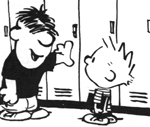 I'm breaking my month o' silence (alas! aghast!) to make a brief note on something I very strongly want to see — need to see — in our school: an anti-bullying program.
I'm breaking my month o' silence (alas! aghast!) to make a brief note on something I very strongly want to see — need to see — in our school: an anti-bullying program.
I suppose I've never raised this in conversation before (either here on the blog, or in person with any of you) because I consider this such a "well, duh."
Bullying is so obviously one of the deep evils of American schooling that it had seemed pointless to decry it; and what appear to be some very good anti-bullying programs had begun spreading in America — an unexpected boon from the Columbine massacre. (An ironic one, if we take Dave Cullen's conclusion that, contrary to the media's consensus, bullying was not a factor that triggered the violence.) I suppose on some level I assumed that, by the time we have middle-schoolers, an anti-bullying program with have become de rigueur in schools everywhere.
This morning, though, I read a blog post by Rod Dreher — one of the most thoughtful conservative columnists writing today — which mulls over some recent teen suicides prompted by bullying.
These shocked me, though of course they shouldn't have — I (blithely) assumed we, as a civilization, had fixed this.
Part of the joys of taking human nature seriously is being freed from having to pretend a strictly rosy or a strictly gloomy picture of what children are. (Ick, ack.) Evolutionary psychology suggests that we contain a great diversity of impulses, some good (empathy, love) and some evil (cruelty, hatred).
David Sloan Wilson — whose Evolution for Everyone should be required reading for us — suggests that which impulses are triggered is largely a matter of the environment. We usually think of human nature as being inside us, but (as Wilson points out) most species evolve to live in a variety of environments. Evolution, thus, needs to prepare the same organisms for all of them. (Genes that figure out how to do this will, in strict Darwinian calculus, propagate themselves.)
My favorite example from his book is the minnow. Minnows that grow up in a pond free of predators will be curious and bold. Minnows that grow up in a pond with predators will be uncurious and cautious.
What's amazing is how sensitive these minnows are to their surroundings. If you raise these fish in a tank, giving them just one exposure to a "predator" (really a plastic trout on a wooden dowel) at the right time of development will trigger them to be skittish, and for the rest of their lives.
Their genes have molded them to be shaped by the environment.
We're minnows, too. We're like that, but much more so. Our genes may have molded us to be more sensitive to our surroundings (physical, social, emotional, intellectual...) than any other species.
This means that the old nature/nurture debate is over. It simply makes no sense to say our traits are determined by x% genes and y% experience: it's our genes that allow us to be shaped by experience. Whether a student is aggressive or peaceful is linked to genes, of course, but it is triggered by environment. If we know them, and plan our environment with them in mind, we can reduce even the drive toward bullying — genes notwithstanding.
This all raises the question: what are these contextual triggers, for humans?
Dreher, who has written about his own experience of being bullied, writes:
Honest to God, I hate middle school and high school so much. I'm sitting here thinking about this story, and my stomach is churning. I wouldn't relive eighth, ninth, and tenth grade again for anything.
Bullying's effects, for him, seem quite long-lasting effects.
So, some questions for us:
- How should we consider doing this "no bullying, ever" ethos? Are there programs we should look into? Is it really just as simple as deciding, right now, that any bullying will be tolerated?
- How deep do we need to go into relationships between kids? Do we draw a bright line around "bullying" (however we define it), or do we demand that kids are actually civil and (more extremely) kind to one another?
And, maybe most interestingly for me —
- Are there any dangers in pursuing an anti-bullying program? I'm thinking of how seemingly-sensible "no weapons" policies have been inhumanly applied in schools — suspending 8-year-olds for bringing in a butter knife to cut a birthday cake, and whatnot.
So — your thoughts!